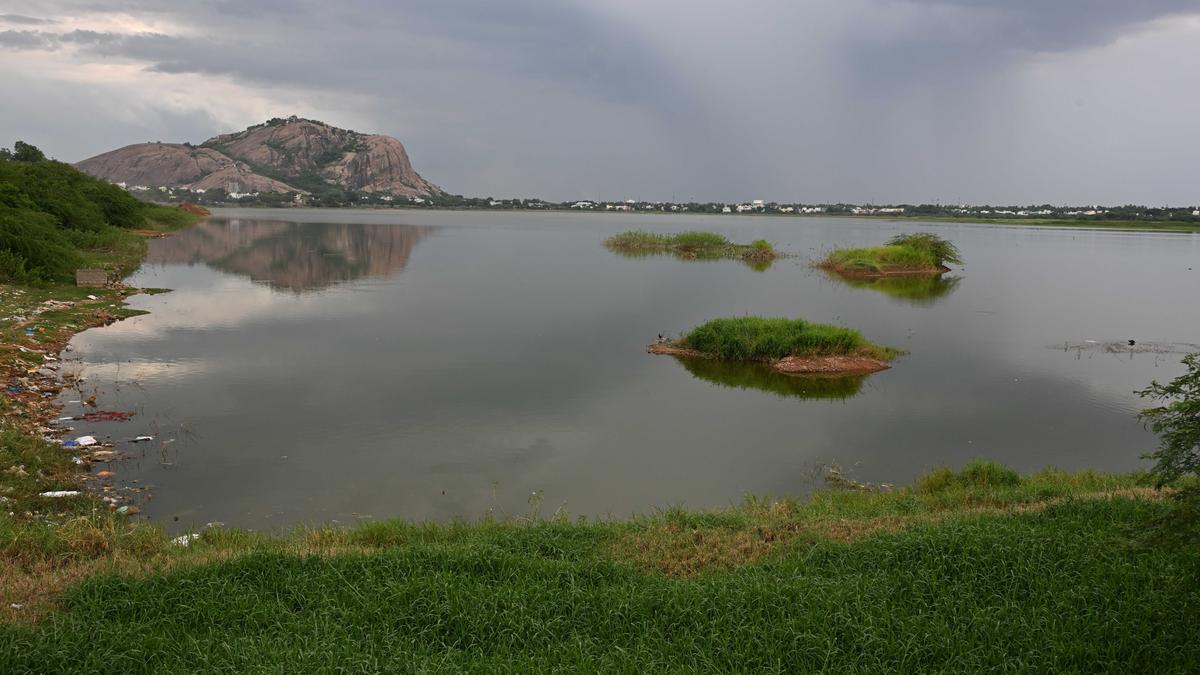Under the Tamil Nadu Land Consolidation (for Special Projects) Act, 2023, land, even if it contains water bodies, can be acquired for special projects by entities in exchange for land elsewhere. File photo for representation.
| Photo Credit: The Hindu
The Tamil Nadu Land Consolidation (for Special Projects) Act, 2023, came into effect on October 18 , sparking controversy. While the State government sees the Act as a necessary step to streamline land acquisition for large-scale infrastructure projects, the law has drawn sharp criticism from environmentalists, farmers’ associations, and civil society groups, who fear that it could further erode the State’s already dwindling water bodies and undermine the rights of local communities.
The Act aims to simplify the consolidation of government land for “special projects,” which include infrastructure, industrial, agricultural, and commercial developments requiring no less than 100 hectares. Under the law, land, even if it contains water bodies, can be acquired for special projects by entities in exchange for land elsewhere.
Also read | Anbumani warns T.N. govt. against ‘privatising’ waterbodies
On paper, the Act is presented as a way of protecting water channels that may change course over time or pass through private land. Critics argue that in practice, however, what is actually a crucial environmental concern could become an unchecked opportunity for land acquisition and privatisation of the State’s water bodies.
What was more worrying was that the Act was passed quickly with little discussion or scrutiny. This raised concerns on why the government was in a rush. The Minister for Revenue and Disaster Management, K.K.S.S.R. Ramachandran, defended the Act, stating that it primarily aims to tackle the inefficiencies and delays created by the fragmentation of land laws. However, activists argue that the provisions in fine print leave far too much room for potential misuse.
Also read | State government urged to repeal Land Consolidation (Special Projects) Act
The provisions allowing the government to designate projects as “special” and expedite land acquisition are particularly concerning. Under the Act, any project requiring more than 100 hectares of land can be approved for consolidation, even if water bodies are located within the proposed land. This could pave way for large infrastructure projects to proceed unchecked, with little regard for environmental impact or the interests of local communities. Further, the public has little say over which projects are designated as “special.” The decision rests entirely with the government, as public hearings only occur after the project has been approved.
Protections for farmers or other local stakeholders are not explicitly stated. Activists say that once the land is handed over to private corporations, these communities could find themselves excluded from decision-making processes, with their access to water sources severely restricted.
The rules under the Act outline a process where project proponents can prepare land consolidation proposals to be reviewed by an expert committee. The committee is responsible for publishing the proposal details in newspapers, conducting public hearings, and then drafting a land consolidation scheme. Once the government approves the scheme, it will be published in the gazette.
While the inclusion of an expert committee aims to bring transparency to the process, environmental advocates remain sceptical. With the committee largely composed of government-appointed officials, questions arise about whether it will truly serve the public interest.
Moreover, experts argue that the Act fails to address the need for safeguarding hydrological pathways — the inlets and outlets crucial for maintaining the ecological balance of water bodies. If these natural water channels are encroached upon, the water bodies could be severely impacted, threatening the livelihoods of thousands who depend on them.
The Act makes provisions for compensating landowners and offering them alternative lands, but it fails to provide safeguards for those whose livelihoods directly depend on these ecosystems. Additionally, it does not clearly define the role of the Tamil Nadu Pollution Control Board in the land consolidation process, even though pollution is a significant concern in areas near water bodies.
These concerns take on added significance when viewed in the context of how land use changes contribute to environmental disasters such as flooding. In December 2021, the Tamil Nadu government informed the Madras High Court that 47,707 acres of water body land across the State were under encroachment. This shows the pressing need to protect these critical ecosystems, rather than allowing them to be subsumed for large projects.
Published – November 06, 2024 01:20 am IST
